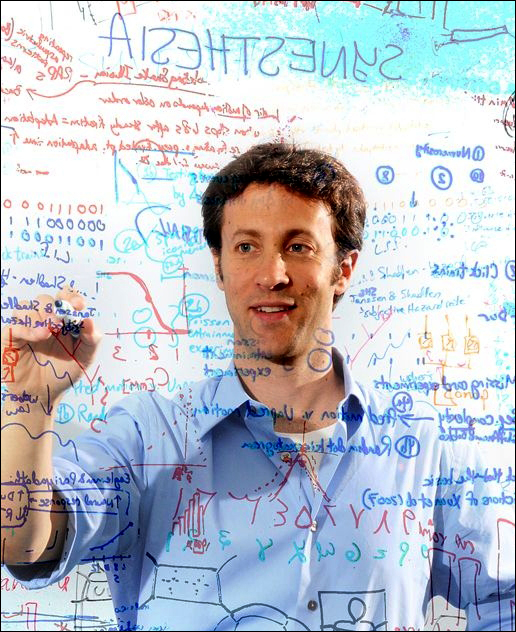Imagine a world of magenta Tuesdays, wavy green symphonies, tastes that have shapes, and words that have taste. Called synesthesia, this human perceptual condition in which information between the senses is blended has long fascinated scientists and laypeople alike. Award-winning neuroscientist and New York Times bestselling author David Eagleman presents new findings from his research into the behavioral, neurological, and genetic characteristics of synesthetes.
There are an infinite number of boring things to do in science. But we live these short life spans. Why not do the thing that's the coolest thing in the world to do? —David Eagleman, The New Yorker
David Eagleman is best known for his work on time perception, synesthesia, and neurolaw. He directs the Laboratory for Perception and Action at the Baylor College of Medicine, whose goal is to understand how the brain constructs perception, how different brains do so differently, and how this matters for society. He also founded and directs Baylor's Initiative on Neuroscience and Law, which studies how new discoveries in neuroscience should navigate the way we make laws, punish criminals, and develop rehabilitation. And, he founded and is chief scientific officer for BrainCheck, a company that uses interactive testing on portable tablets to measure brain function, which schools are using to rapidly measure concussions at the sidelines.
In 2011, Eagleman was awarded a Guggenheim Fellowship, and that same year won the Eric Hoffer Book Award Montaigne Medal for his book Wednesday is Indigo Blue: Discovering the Brain of Synesthesia, coauthored with Richard Cytowic. In 2012 he was named Science Educator of the Year by the Society for Neuroscience, and was featured as one of the year's Brightest Idea Guys by Italy's Style Magazine. In 2014, he received the John J. McGovern Award for Excellence in Biomedical Education from the American Medical Writers' Association.
One of his latest books, Livewired: How the Brain Rewrites its Own Circuitry, is due in spring 2015 (Doubleday Canada). Also in Fall 2015, Eagleman will host the new PBS science series, "The Brain with Dr. David Eagleman."
From the Eagleman Laboratory website, in his own words:
"Public understanding of science is a passion of mine, and to that end I have written for the New York Times, Discover Magazine, Atlantic, The Week, Slate, Wired, New Scientist, and others. I speak often on National Public Radio and BBC to discuss what's new and important in science. I have founded a prize in mathematics and physics.
"I am fortunate to be a Guggenheim Fellow. Within the scientific community, I serve as an editor for Journal of Vision, PLoS One, and Seminars in Brain and Consciousness. I also serve on the board of directors for several organizations, including The Long Now Foundation.
"My book of fiction, Sum, was lucky enough to become an international bestseller. It has been translated into 27 languages and was named a Best Book of the Year by Barnes and Noble, New Scientist, and the Chicago Tribune. British musician Brian Eno and I performed a musical reading of Sum at the Sydney Opera House, and German composer Max Richter translated Sum into a full opera at the Royal Opera House in London.
"My neuroscience book Incognito became a New York Times bestseller, and was named a Book of the Year by Amazon, Goodreads, Houston Chronicle, and Boston Globe. No one is writing an opera for that one yet, but I'm keeping my fingers crossed."



